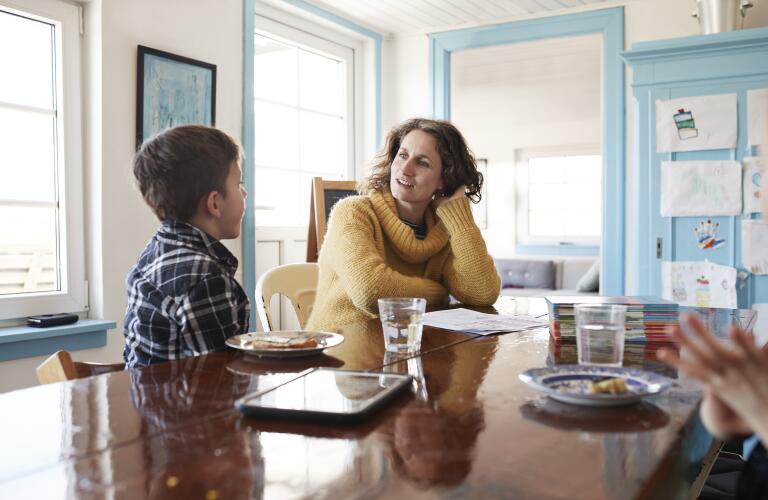Talking to kids about depression is an important conversation. Being upfront about what’s going on can help ease any fears they have.
Parents become good actors out of necessity. When you feel sad or hopeless, you want to hide it to protect your kids. However, your children are more perceptive than you might think. They can pick up on cues that you’re not feeling like yourself. And they’ll worry more if you don’t address the problem.

Speak knowledgeably
Describing depression to your child will be easier if you understand it yourself. Learn what triggers your symptoms and how to treat them before you start the conversation. You might read books or articles about depression. Or contact a mental health provider to help you understand how you’re feeling. A provider can also help you find the right approach for talking to kids about depression. You’re not the first parent to try to explain depression to their kids, and it’s likely your doctor or therapist has coached others through the process before. Don’t hesitate to ask for their guidance.
Be age-appropriate
When describing depression to your kids, tailor the conversation to their age and developmental stage. Young children need a more specific explanation of how depression makes you feel. For example, you might say: “Remember when I yelled at you yesterday? Sometimes I get sad or worried and I yell when I don’t mean to.” Older kids can understand deeper concepts. You might explain how depression affects you day to day, and why parenting with depression is sometimes difficult for you. Regardless of their age, make sure they know your depression is not their fault.
Invite questions
Expect your children to ask questions. Answer them as honestly as you can. If you don’t know the answer to a question, it’s okay to say you don’t know. Consider scheduling a family session with your therapist or psychiatrist so your kids have an opportunity to ask an expert any questions you can’t answer. Encourage your kids to talk to you whenever they have concerns.
Offer reassurance
Kids naturally look for solutions to problems. Let your child know you are getting help. You might tell an older child how you’re treating your depression, whether that’s with medicine, therapy, or lifestyle changes such as yoga or meditation.
Also, reassure your child that your depression is not caused by them in any way. You don’t want them to think anything they did led to your sadness. Let younger children know that depression isn’t contagious. They can’t catch it from you.
Make time
Depression and family time can conflict. You may need extra space for yourself during your down moods. This is especially true for working moms with depression, who often don’t have enough time to begin with. Try to keep up a family routine in the time you do have available. Eat dinner together on most nights of the week. Watch a favorite TV show or movie as a family on the weekends. Read a story together before bedtime. Having routines like these gives children a sense of comfort and normalcy.
Give them tools
Many different resources were designed to explain depression to children. If you’re having trouble finding the right words when describing depression, use one of these tools. You might read a book about depression with a younger child, and steer an older child to a reputable website. If your child seems especially distressed, get help from their pediatrician or a child mental health specialist.
Check in
Talking to kids about depression isn’t just a one-time discussion. You want to keep the conversation going for as long as your symptoms continue. Have regular check-ins with your kids to make sure they’re still okay. Use those times to ask whether they have any questions, or if there’s anything they’re unsure about that you can explain.
It can be difficult to accept that your depression impacts your children, but it’s important to be upfront and appropriately honest with your kids about your mental health so they don’t come to their own conclusions. The good news is you’re not alone–there are many resources to help guide you through these conversations, from your doctors and therapists to reputable websites and books.





